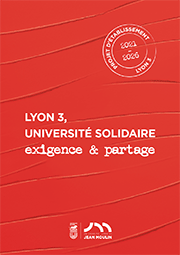AccueilRechercheLes productions scientifiquesThèsesThèses soutenuesThèses soutenues - 2006-2020Thèses soutenues - 2011
-
Partager cette page
- Recherche,
HOISOI Ayame
Le « Corps asiatique » de Yang Seog-il, fils du Japon post-colonial : Questions sur la subjectivité et le parricide dans la littérature Zainichi contemporaine et intertexte avec la littérature maghrébine d’expression française.»
Thèse d'2tude de l'Asie et ses diasporas soutenue le 9 décembre 2011
Cette thèse, située dans le contexte post-colonial au Japon, s’articule autour d’un concept crée par Yang Seog-il, écrivain contemporain zainichi : le « corps asiatique ». Après avoir circonscrit le champ d’analyse couvert par ce terme, notre étude formule la problématique suivante : par quels moyens ce « corps asiatique » s’affronte, dans la littérature de Yang -dite zainichi-, au dépassement de l’ère coloniale et post-coloniale au Japon ? Au cours de cette étude, nous recourrons à l’intertexte de la littérature maghrébine d’expression française (de Azouz Begag en particulier) lu comme dans un miroir. La première partie cartographie les contextes socio-historiques de ces deux populations diasporiques, formées de décolonisés -Zainichi au Japon et Français issus de l’immigration maghrébine en France- apparues au siècle dernier, ainsi que le processus de formation des catégories littéraires associées à ces populations. Ensuite, nous entrons dans la profondeur du corpus, en abordant la manifestation de la subjectivité des (ex-) colonisés en tant que corps asiatique, à l’aide de l’épistémologie de Mikhaïl Bakhtine. La troisième partie enfin, est consacrée à une nouvelle lecture de ces œuvres, en établissant un lien entre le thème littéraire du parricide et le « corps asiatique ». Fils du Japon post-colonial, Yang Seog-il désire éliminer et dépasser un père tant filial que symbolique. Cependant, sa tentative de dépassement qui se veut passer par la féminisation de ce « corps asiatique » nous invite à effectuer une ultime lecture sous l’angle de la critique féministe post-coloniale, pour en dévoiler les restes de rapports de domination.
Mots clefs : Japon, Zainichi, Yang Seog-il, post-colonial, littérature contemporaine, subjectivité, parricide, critique féministe, études du genre, intertexte, immigration maghrébine en France, Azouz Begag,
Key words :
Directeur de thèse : Jean-Pierre GIRAUD
Membres du jury :
Mokoto ASARI, Professeur, Université de Bordeaux III
Takashi WAKUI, Professeur, Université de Nagoya - Japon
Claire DODANE, Professeur, Université Jean Moulin Lyon 3
Yves Marie ALLIOUX, Maître de conférences, Université de Toulouse II Le Mirail
Hassan SAHLOUL, Professeur, Université Jean Moulin Lyon 3
Jean-Pierre GIRAUD, Professeur, Université Jean Moulin Lyon 3
Président du jury : Claire DODANE
Mention : Très honorable avec les félicitations du jury
Equipe d'accueil : CERFF



